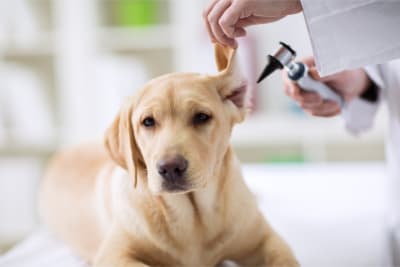Ear Infections In Dogs
Unfortunately, dogs are particularly susceptible to ear infections, especially if your dog has long floppy ears or regularly goes swimming. Due to the shape of their ear canals, it is easy for moisture to become trapped in the ear canal which creates the perfect environment for bacteria to thrive.
Dogs can experience three types of ear infections, known otitis externa, media, and internet. The most common is otitis externa, or an outer ear infection, which happens when there is inflammation in the outer ear canal. Otitis media and interna refer to infections of the middle and inner ear canal, respectively. Middle and inner ear infections in dogs often result from the spread of infection from the external ear.
Middle and inner ear infections can be very serious and can result in deafness, a loss of coordination and balance, and in severe cases, facial paralysis.
If you notice any signs of an ear infection, it is important to take your pup to the vet right away!
Causes of Ear Infections
Bacterial ear infections in dogs are common due to the ear canal shape issue mentioned above. However, there can be other causes of ear infections in dogs such as yeast, fungus, ear mites, tumors, or polyps.
Physical trauma or objects lodged in the ear can also cause an infection in your pup's ear.
Signs of Ear Infection in Dogs
If your pup is suffering from an ear infection, chances are they are uncomfortable or in pain. If your dog displays any of the symptoms below, it is time for a trip to the vet.
Early treatment of ear infections can help to prevent more severe symptoms from developing and reduce the chances of complications.
Common signs of ear infections in dogs include:
- Pawing or rubbing at the ear
- Brown, yellow or bloody discharge
- Odor in the ear
- Redness inside of the ear
- Head shaking
- Tilting head
- Crusts or scabs just inside the ear
- Swelling of the ear
Severe ear infections in dogs may cause more serious symptoms, such as:
- Indications of hearing loss
- Loss of coordination or balance
- Unusual eye movements
- Walking in circles
How Dog Ear Infections are Treated
If your dog is diagnosed with an ear infection, treatment typically begins with the vet applying a medicated cleanser and prescribing your dog the appropriate antibiotic or other anti-inflammatory medication. Your vet may also prescribe a topical medication and instruct you on how and when to apply it to your dog's ear at home.
Mild infections that are caught early typically clear up in a week or two. If your dog's ear infection is more severe or caused by an underlying health condition, treatment may be more challenging and the infection may take longer to resolve. Unfortunately, it is common for severe cases to lead to chronic ear infections in dogs.
You must follow your vet's instructions carefully and finish any recommended treatments. Not finishing prescriptions can lead to a recurring infection that becomes increasingly difficult to treat.
Follow-up appointments with your vet are highly recommended to ensure the treatment has worked and the infection has completely cleared. Your vet will be able to ensure there are no lingering signs of infection that require further treatment.
Preventing Ear Infections in Dogs
To help prevent your pup from developing an ear infection it is important to keep your pet's ears clean and dry.
Speak to your primary care veterinarian about the best cleaning solution to use for your dog's ears, take the time to gently clean your dog's ears every week, and always dry your dog's ears whenever they come out of the water.
Note: The advice provided in this post is intended for informational purposes and does not constitute medical advice regarding pets. For an accurate diagnosis of your pet's condition, please make an appointment with your vet.
Do you suspect your dog is suffering from an ear infection? Contact our South Wilton Veterinary Group vets today to make an appointment.
 Looking for advice on how to help your dog with an ear infection in South Wilton?
Looking for advice on how to help your dog with an ear infection in South Wilton?
We're always accepting new patients, so contact our veterinary hospital today to book your pet's first appointment.
Related Articles View All
What Are the Symptoms of a Spider Bite on a Dog?
Spiders would rather hide from you and your pet than bite, but spider bites do occur on occasion. In some cases, the spider bites our South Wilton vets see on dogs cause serious symptoms that necessitate immediate medical attention; however, most spider bites on dogs cause minor irritation but are generally harmless. Learn more about spider bites on dogs in the sections below.
How Long Does Spaying Take?
Spaying your female pet is a great way to prevent unwanted litters of kittens or puppies. It can also help deter unwanted behaviors and protect your pet from some serious forms of cancer. Here, our South Wilton vets explain more about the spaying process.
Routine Vet Exams - Why Are Regular Veterinary Checkups Important?
During a routine exam, your veterinarian will check your pet regularly for symptoms of illness, internal health issues and other serious conditions that may need to be addressed. Here, our vets in South Wilton explain why regularly scheduled veterinary checkups are so important.
Dogs Eating Grass: Why Do They Do It - Is my Dog Poisoned?
Have you ever observed your canine companion munching on grass and found yourself curious about the reason behind this behavior? Allow us to provide insight. Our veterinarians in South Wilton receive inquiries about this intriguing habit and its potential impact on dogs' well-being.

